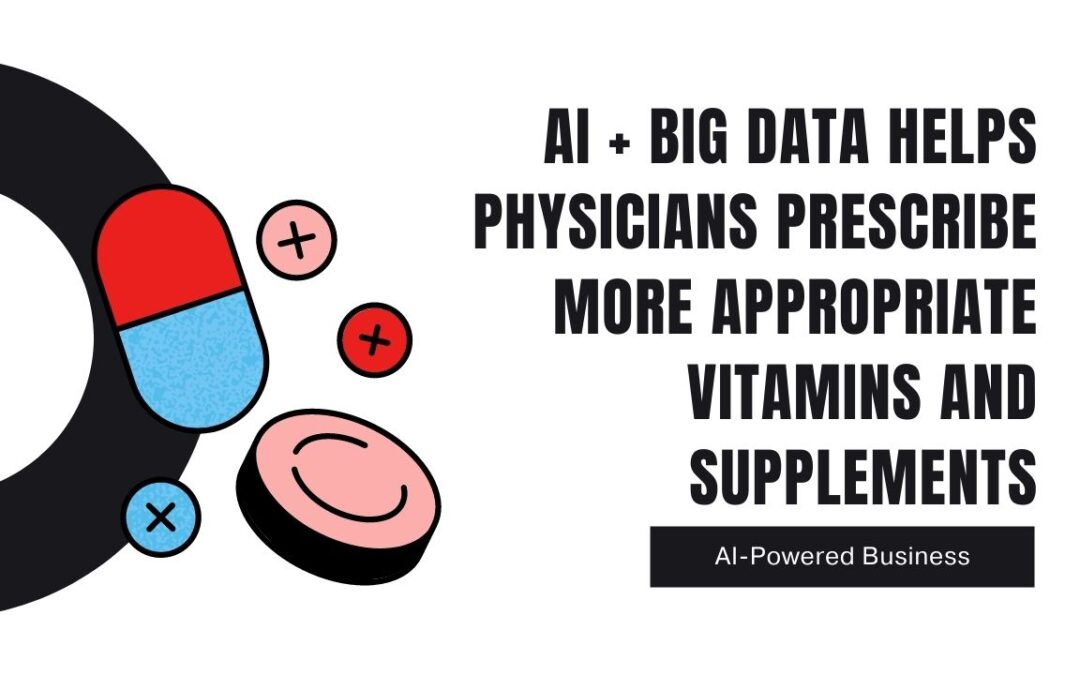With the rise of self-care and preventative health, more Americans take vitamins and supplements to improve their overall well-being. However, this also means that physicians are seeing an increase in patients already taking medication and want to know if they should be taking additional vitamins or supplements. AI + big data helps doctors prescribe more appropriate vitamins and supplements by providing intelligent recommendations based on a patient’s specific medication.
This allows doctors to access, cross-reference quickly, and provide recommendations on balancing the ingredients found in the prescription medication with the ingredients that make up daily vitamins and supplements. This helps patients get the most out of their vitamins and supplements and improve their overall health.
In addition to providing recommendations, AI + big data can also help doctors monitor a patient’s progress. By tracking a patient’s vitamin and supplement intake, physicians can see if the patient is taking the recommended amount and make adjustments as needed. This helps ensure that patients are getting the most benefit from their vitamins and supplements and improve their overall health.
So how can physicians tap artificial intelligence to enhance treatments?
- By building recommendations of products that specialists will add to existing treatments. Docs can use big data and the growing number of personalized nutrition programs that employ AI to choose one of the trillions of vitamin and nutrient combinations best suited for the patient or feed particular recommendations into the technology platform.
- By developing systems that help doctors better understand how their patients respond to treatment and make necessary adjustments. Platforms can constantly collect data on a patient’s health and well-being, then use AI to identify patterns and trends. When something changes, the system can flag it for the physician so they can investigate and make necessary changes to the treatment plan.
- Finally, providers can share their results cross-platform to promote complete, comprehensive healthcare. When a patient’s primary care physician, nutritionist, and AI-enabled health coach are all on the same page, better health is sure to follow.
An example of data use is the Apple Health app, which allows patients to share their health data with their healthcare providers. The app gives users the option to share their data with their physician through a feature called “Health Records.” Health Records include allergies, medical conditions, immunizations, lab results, medications, and vitals. This feature is helpful for patients who want to keep track of their health data in one place and share it with their doctor.
A great example of a company is Persona. Persona delivers the simplicity and convenience of a nutritional supplements program – personalized for users by artificial intelligence and experts. Persona’s AI-enabled app analyzes a user’s health data, health goals, lifestyle, allergies, and even medications to develop a unique supplement plan. With the insight, Persona’s algorithms identify the specific ingredients, doses, and timing that will work best for each individual. Afterward, patients get custom daily supplement packs.
Examples of businesses in the AI-powered supplements plans
Another example is Viome. Viome’s test analyzes a person’s gut microbiome to identify which foods they should eat and avoid for optimal health. The company then creates a personalized nutrition plan based on the test results. The scientific knowledge behind the system is based on data from over 300,000 people and is bolstered by numerous clinical trials that have lasted almost four years. The firm specializes in mRNA analysis to see how internal and external elements such as your diet, stress, exercise, illness, or microbes may affect the patient. Knowing how to change and improve your environment can help you live a longer, healthier life.
Personalized supplements and vitamins programs are the future of healthcare. With the help of AI, big data, and experts, these programs will become more sophisticated and tailored to each individual. This will lead to better health outcomes for patients and a reduction in the overall cost of healthcare. Diabetes cost the United States $237 billion in direct medical expenditures in 2017. Early treatment holds the potential to save more than $100 billion. The way we think about health is changing. We are moving from a focus on treating disease to preventing it in the first place and predicting the way the disease might unfold. This shift is being driven by advances in nutrition and vitamins, supplements, and medicine.
Conclusion
The use of AI to help physicians prescribe more appropriate vitamins and supplements is a promising development in healthcare. This technology has the potential to improve patient outcomes by providing tailored recommendations based on individual needs. Precision in recommending supplements and vitamins will not cure illnesses instantly, but it does contribute to a better holistic and customized treatment approach.

